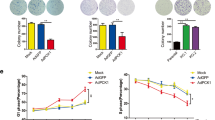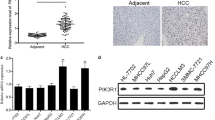Abstract
Pyruvate kinase M2 (PKM2) is a member of the pyruvate kinase family. It has been recently reported that PKM2 displays non-metabolic activities. Nevertheless, understanding of the role of PKM2 in hepatocellular carcinoma (HCC) is insufficient. Therefore, our study aimed at exploring the impact of PKM2 on malignant growth, autophagy as well as invasion in HCC. Expression of PKM2 in HCC specimens was examined by qRT-PCR and western blot. PKM2 knock down was generated in vitro by shRNA. Activities of malignant cells as well as downstream pathways were assessed. The MTT assay was carried out to evaluate HCC proliferation, and the FACS assay was conducted to study cell death. Elevated PKM2 levels were observed in HCC samples. Knockdown (KD) of PKM2 triggered apoptosis as well as autophagy and inhibited migration and proliferation of HCC cells. Furthermore, PKM2 KD reinforced JAK/STAT3 pathway stimulation. STAT3 inhibition counteracted the impact of PKM2 on proliferation, autophagy, migration as well as cell death in HCC. To conclude, the findings of our research suggest that PKM2 reinforced metastasis and inhibited autophagy in HCC through the JAK/STAT3 pathway, and that PKM2 could serve as a promising target for HCC treatment.







Similar content being viewed by others
Data availability
My manuscript has no associated data.
References
Schwarz C, Fitschek F, Mittlbock M, Saukel V, Bota S, Ferlitsch M, Ferlitsch A, Bodingbauer M, Kaczirek K (2020) von Willebrand factor antigen predicts outcomes in patients after liver resection of hepatocellular carcinoma. Gut Liver 14:218–224. https://doi.org/10.5009/gnl17115
Tseng PL, Wu WH, Hu TH, Chen CW, Cheng HC, Li CF, Tsai WH, Tsai HJ, Hsieh MC, Chuang JH, Chang WT (2018) Decreased succinate dehydrogenase B in human hepatocellular carcinoma accelerates tumor malignancy by inducing the Warburg effect. Sci Rep 8:3081. https://doi.org/10.1038/s41598-018-21361-6
Liu W, Kang L, Han J, Wang Y, Shen C, Yan Z, Tai Y, Zhao C (2018) miR-342-3p suppresses hepatocellular carcinoma proliferation through inhibition of IGF-1R-mediated Warburg effect. Onco Targets Ther 11:1643–1653. https://doi.org/10.2147/OTT.S161586
Zarrinpar A, Faltermeier CM, Agopian VG, Naini BV, Harlander-Locke MP, Kaldas FM, Farmer DG, Busuttil RW (2019) Metabolic factors affecting hepatocellular carcinoma in steatohepatitis. Liver Int 39:531–539. https://doi.org/10.1111/liv.14002
Zhao B, Fan S, Fan Z, Wang H, Zhang N, Guo X, Yang D, Wu Q, Yu B, Zhou S (2018) Discovery of pyruvate kinase as a novel target of new fungicide candidate 3-(4-methyl-1,2,3-thiadiazolyl)-6-trichloromethyl-[1,2,4]-triazolo-[3,4- b][1,3,4]-thiadizole. J Agric Food Chem 66:12439–12452. https://doi.org/10.1021/acs.jafc.8b03797
Miao G, Han J, Zhang J, Wu Y, Tong G (2019) Targeting pyruvate kinase M2 and hexokinase II, pachymic acid impairs glucose metabolism and induces mitochondrial apoptosis. Biol Pharm Bull 42:123–129. https://doi.org/10.1248/bpb.b18-00730
Yao A, Xiang Y, Si YR, Fan LJ, Li JP, Li H, Guo W, He HX, Liang XJ, Tan Y, Bao LY, Liao XH (2019) PKM2 promotes glucose metabolism through a let-7a-5p/Stat3/hnRNP-A1 regulatory feedback loop in breast cancer cells. J Cell Biochem 120:6542–6554. https://doi.org/10.1002/jcb.27947
Gao S, Chen M, Wei W, Zhang X, Zhang M, Yao Y, Lv Y, Ling T, Wang L, Zou X (2018) Crosstalk of mTOR/PKM2 and STAT3/c-Myc signaling pathways regulate the energy metabolism and acidic microenvironment of gastric cancer. J Cell Biochem. https://doi.org/10.1002/jcb.26915
Lin Y, Meng F, Lu Z, Chen K, Tao Y, Ouyang Y, Cao X (2018) Knockdown of PKM2 suppresses tumor progression in human cervical cancer by modulating epithelial-mesenchymal transition via Wnt/beta-catenin signaling. Cancer Manag Res 10:4191–4202. https://doi.org/10.2147/CMAR.S178219
Kurihara-Shimomura M, Sasahira T, Nakashima C, Kuniyasu H, Shimomura H, Kirita T (2018) The multifarious functions of pyruvate kinase M2 in oral cancer cells. Int J Mol Sci 19:2907. https://doi.org/10.3390/ijms19102907
Wiese EK, Hitosugi T (2018) Tyrosine kinase signaling in cancer metabolism: PKM2 paradox in the Warburg effect. Front Cell Dev Biol 6:79. https://doi.org/10.3389/fcell.2018.00079
Ma T, Patel H, Babapoor-Farrokhran S, Franklin R, Semenza GL, Sodhi A, Montaner S (2015) KSHV induces aerobic glycolysis and angiogenesis through HIF-1-dependent upregulation of pyruvate kinase 2 in Kaposi’s sarcoma. Angiogenesis 18:477–488. https://doi.org/10.1007/s10456-015-9475-4
Johnson DE, O’Keefe RA, Grandis JR (2018) Targeting the IL-6/JAK/STAT3 signalling axis in cancer. Nat Rev Clin Oncol 15:234–248. https://doi.org/10.1038/nrclinonc.2018.8
Sakamoto A, Kunou S, Shimada K, Tsunoda M, Aoki T, Iriyama C, Tomita A, Nakamura S, Hayakawa F, Kiyoi H (2019) Pyruvate secreted from patient-derived cancer-associated fibroblasts supports survival of primary lymphoma cells. Cancer Sci 110:269–278. https://doi.org/10.1111/cas.13873
Zhu Q, Hong B, Zhang L, Wang J (2018) Pyruvate kinase M2 inhibits the progression of bladder cancer by targeting MAKP pathway. J Cancer Res Ther 14:S616–S621. https://doi.org/10.4103/0973-1482.187302
Yang Y, Meng Q, Wang C, Li X, Lu Y, Xin X, Zheng Q, Lu D (2018) MicroRNA 675 cooperates PKM2 to aggravate progression of human liver cancer stem cells induced from embryonic stem cells. J Mol Med 96:1119–1130. https://doi.org/10.1007/s00109-018-1687-9
Hasan D, Gamen E, Abu Tarboush N, Ismail Y, Pak O, Azab B (2018) PKM2 and HIF-1alpha regulation in prostate cancer cell lines. PLoS ONE 13:e0203745. https://doi.org/10.1371/journal.pone.0203745
Cao Y, Lin Y, Wang D, Pan D, Zhang Y, Jin Y, Zheng C (2018) Enhancing 5-fluorouracil efficacy through suppression of PKM2 in colorectal cancer cells. Cancer Chemother Pharmacol 82:1081–1086. https://doi.org/10.1007/s00280-018-3676-7
Yasumizu Y, Hongo H, Kosaka T, Mikami S, Nishimoto K, Kikuchi E, Oya M (2018) PKM2 under hypoxic environment causes resistance to mTOR inhibitor in human castration resistant prostate cancer. Oncotarget 9:27698–27707. https://doi.org/10.18632/oncotarget.25498
van Niekerk G, Engelbrecht AM (2018) Role of PKM2 in directing the metabolic fate of glucose in cancer: a potential therapeutic target. Cell Oncol (Dordr) 41:343–351. https://doi.org/10.1007/s13402-018-0383-7
Li Q, Cao L, Tian Y, Zhang P, Ding C, Lu W, Jia C, Shao C, Liu W, Wang D, Ye H, Hao H (2018) Butyrate suppresses the proliferation of colorectal cancer cells via targeting pyruvate kinase M2 and metabolic reprogramming. Mol Cell Proteom 17:1531–1545. https://doi.org/10.1074/mcp.RA118.000752
Qian Y, Bi L, Yang Y, Wang D (2018) Effect of pyruvate kinase M2-regulating aerobic glycolysis on chemotherapy resistance of estrogen receptor-positive breast cancer. Anticancer Drugs 29:616–627. https://doi.org/10.1097/CAD.0000000000000624
Zheng B, Liu F, Zeng L, Geng L, Ouyang X, Wang K, Huang Q (2018) Overexpression of pyruvate kinase type M2 (PKM2) promotes ovarian cancer cell growth and survival via regulation of cell cycle progression related with upregulated CCND1 and downregulated CDKN1A expression. Med Sci Monit 24:3103–3112. https://doi.org/10.12659/MSM.907490
Bian Z, Zhang J, Li M, Feng Y, Wang X, Zhang J, Yao S, Jin G, Du J, Han W, Yin Y, Huang S, Fei B, Zou J, Huang Z (2018) LncRNA-FEZF1-AS1 promotes tumor proliferation and metastasis in colorectal cancer by regulating PKM2 signaling. Clin Cancer Res 24:4808–4819. https://doi.org/10.1158/1078-0432.CCR-17-2967
Liu BW, Wang TJ, Li LL, Zhang L, Liu YX, Feng JY, Wu Y, Xu FF, Zhang QS, Bao MZ, Zhang WY, Ye LH (2019) Oncoprotein HBXIP induces PKM2 via transcription factor E2F1 to promote cell proliferation in ER-positive breast cancer. Acta Pharmacol Sin 40:530–538. https://doi.org/10.1038/s41401-018-0015-9
Li RZ, Fan XX, Shi DF, Zhu GY, Wang YW, Luo LX, Pan HD, Yao XJ, Leung EL, Liu L (2018) Identification of a new pyruvate kinase M2 isoform (PKM2) activator for the treatment of non-small-cell lung cancer (NSCLC). Chem Biol Drug Des 92:1851–1858. https://doi.org/10.1111/cbdd.13354
Zhang K, Zhang M, Jiang H, Liu F, Liu H, Li Y (2018) Down-regulation of miR-214 inhibits proliferation and glycolysis in non-small-cell lung cancer cells via down-regulating the expression of hexokinase 2 and pyruvate kinase isozyme M2. Biomed Pharmacother 105:545–552. https://doi.org/10.1016/j.biopha.2018.06.009
Grander D, Panaretakis T (2010) Autophagy: cancer therapy’s friend or foe? Future Med Chem 2:285–297. https://doi.org/10.4155/fmc.09.155
Pavlides S, Vera I, Gandara R, Sneddon S, Pestell RG, Mercier I, Martinez-Outschoorn UE, Whitaker-Menezes D, Howell A, Sotgia F, Lisanti MP (2012) Warburg meets autophagy: cancer-associated fibroblasts accelerate tumor growth and metastasis via oxidative stress, mitophagy, and aerobic glycolysis. Antioxid Redox Signal 16:1264–1284. https://doi.org/10.1089/ars.2011.4243
Livesey KM, Tang D, Zeh HJ, Lotze MT (2008) Not just nuclear proteins: “novel” autophagy cancer treatment targets: p53 and HMGB1. Curr Opin Investig Drugs 9:1259–1263
Zhang B, Yin X, Sui S (2018) Resveratrol inhibited the progression of human hepatocellular carcinoma by inducing autophagy via regulating p53 and the phosphoinositide 3kinase/protein kinase B pathway. Oncol Rep 40:2758–2765. https://doi.org/10.3892/or.2018.6648
Chang R, Song L, Xu Y, Wu Y, Dai C, Wang X, Sun X, Hou Y, Li W, Zhan X, Zhan L (2018) Loss of Wwox drives metastasis in triple-negative breast cancer by JAK2/STAT3 axis. Nat Commun 9:3486. https://doi.org/10.1038/s41467-018-05852-8
Ma J, Song X, Xu X, Mou Y (2019) Cancer-associated fibroblasts promote the chemo-resistance in gastric cancer through secreting IL-11 targeting JAK/STAT3/Bcl2 pathway. Cancer Res Treat 51:194–210. https://doi.org/10.4143/crt.2018.031
Xue J, Liao L, Yin F, Kuang H, Zhou X, Wang Y (2018) LncRNA AB073614 induces epithelial-mesenchymal transition of colorectal cancer cells via regulating the JAK/STAT3 pathway. Cancer Biomark 21:849–858. https://doi.org/10.3233/CBM-170780
Li M, Zheng R, Yuan FL (2018) MiR-410 affects the proliferation and apoptosis of lung cancer A549 cells through regulation of SOCS3/JAK-STAT signaling pathway. Eur Rev Med Pharmacol Sci 22:5987–5993. https://doi.org/10.26355/eurrev_201809_15933
Author information
Authors and Affiliations
Corresponding author
Ethics declarations
Conflict of interest
The authors declare that they have no competing interests.
Additional information
Publisher's Note
Springer Nature remains neutral with regard to jurisdictional claims in published maps and institutional affiliations.
Rights and permissions
About this article
Cite this article
Yu, Z., Wang, D. & Tang, Y. PKM2 promotes cell metastasis and inhibits autophagy via the JAK/STAT3 pathway in hepatocellular carcinoma. Mol Cell Biochem 476, 2001–2010 (2021). https://doi.org/10.1007/s11010-020-04041-w
Received:
Accepted:
Published:
Issue Date:
DOI: https://doi.org/10.1007/s11010-020-04041-w




